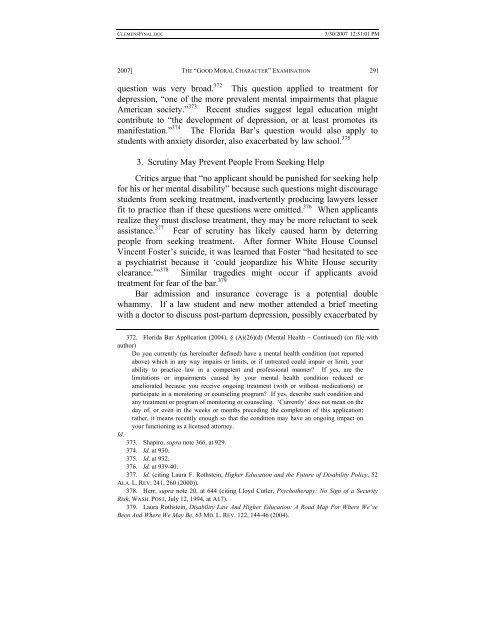Facing the Klieg Lights: Understanding the "Good Moral Character"
Facing the Klieg Lights: Understanding the "Good Moral Character"
Facing the Klieg Lights: Understanding the "Good Moral Character"
Create successful ePaper yourself
Turn your PDF publications into a flip-book with our unique Google optimized e-Paper software.
CLEMENSFINAL.DOC<br />
3/30/2007 12:51:01 PM<br />
2007] THE “GOOD MORAL CHARACTER” EXAMINATION 291<br />
question was very broad. 372 This question applied to treatment for<br />
depression, “one of <strong>the</strong> more prevalent mental impairments that plague<br />
American society.” 373 Recent studies suggest legal education might<br />
contribute to “<strong>the</strong> development of depression, or at least promotes its<br />
manifestation.” 374 The Florida Bar’s question would also apply to<br />
students with anxiety disorder, also exacerbated by law school. 375<br />
3. Scrutiny May Prevent People From Seeking Help<br />
Critics argue that “no applicant should be punished for seeking help<br />
for his or her mental disability” because such questions might discourage<br />
students from seeking treatment, inadvertently producing lawyers lesser<br />
fit to practice than if <strong>the</strong>se questions were omitted. 376 When applicants<br />
realize <strong>the</strong>y must disclose treatment, <strong>the</strong>y may be more reluctant to seek<br />
assistance. 377 Fear of scrutiny has likely caused harm by deterring<br />
people from seeking treatment. After former White House Counsel<br />
Vincent Foster’s suicide, it was learned that Foster “had hesitated to see<br />
a psychiatrist because it ‘could jeopardize his White House security<br />
clearance.’” 378 Similar tragedies might occur if applicants avoid<br />
treatment for fear of <strong>the</strong> bar. 379<br />
Bar admission and insurance coverage is a potential double<br />
whammy. If a law student and new mo<strong>the</strong>r attended a brief meeting<br />
with a doctor to discuss post-partum depression, possibly exacerbated by<br />
372. Florida Bar Application (2004), § (A)(26)(d) (Mental Health – Continued) (on file with<br />
author)<br />
Do you currently (as hereinafter defined) have a mental health condition (not reported<br />
above) which in any way impairs or limits, or if untreated could impair or limit, your<br />
ability to practice law in a competent and professional manner? If yes, are <strong>the</strong><br />
limitations or impairments caused by your mental health condition reduced or<br />
ameliorated because you receive ongoing treatment (with or without medications) or<br />
participate in a monitoring or counseling program? If yes, describe such condition and<br />
any treatment or program of monitoring or counseling. ‘Currently’ does not mean on <strong>the</strong><br />
day of, or even in <strong>the</strong> weeks or months preceding <strong>the</strong> completion of this application;<br />
ra<strong>the</strong>r, it means recently enough so that <strong>the</strong> condition may have an ongoing impact on<br />
your functioning as a licensed attorney.<br />
Id.<br />
373. Shapiro, supra note 366, at 929.<br />
374. Id. at 930.<br />
375. Id. at 932.<br />
376. Id. at 939-40.<br />
377. Id. (citing Laura F. Rothstein, Higher Education and <strong>the</strong> Future of Disability Policy, 52<br />
ALA. L. REV. 241, 260 (2000)).<br />
378. Herr, supra note 20, at 644 (citing Lloyd Cutler, Psycho<strong>the</strong>rapy: No Sign of a Security<br />
Risk, WASH. POST, July 12, 1994, at A17).<br />
379. Laura Rothstein, Disability Law And Higher Education: A Road Map For Where We’ve<br />
Been And Where We May Be, 63 MD. L. REV. 122, 144-46 (2004).
















